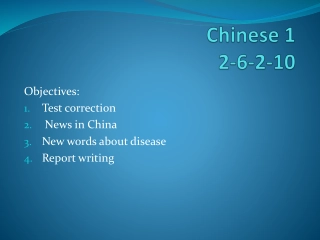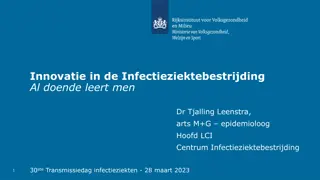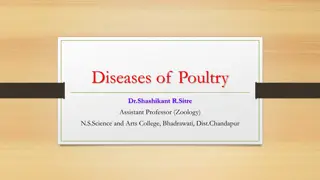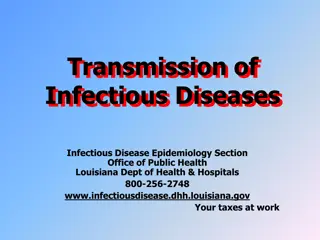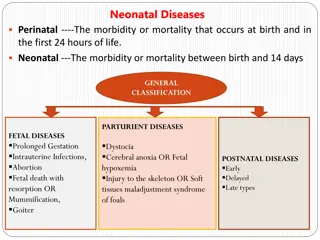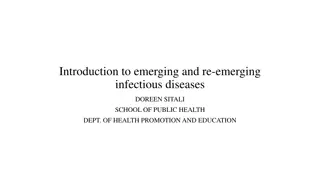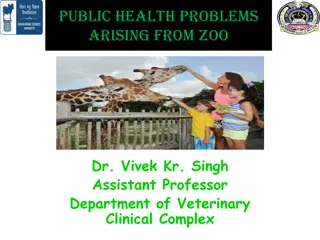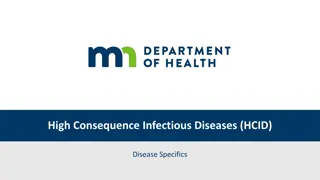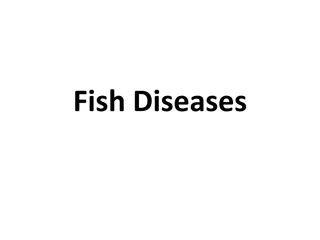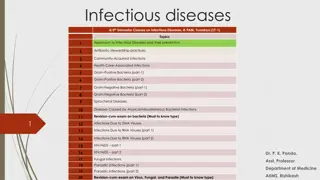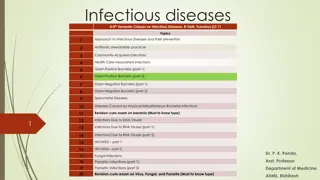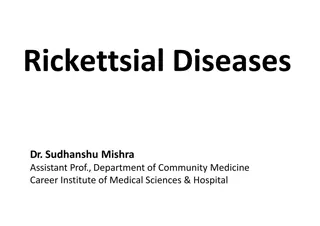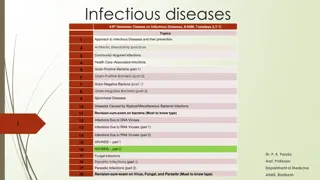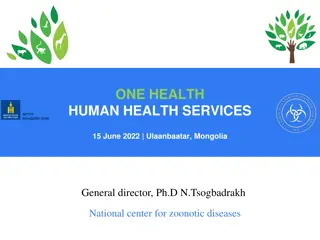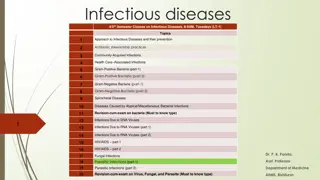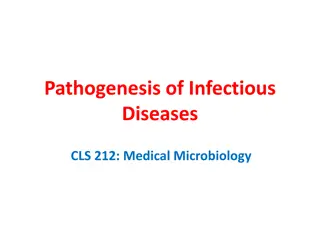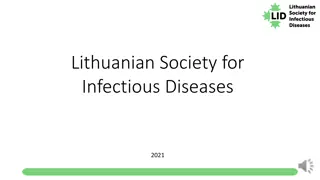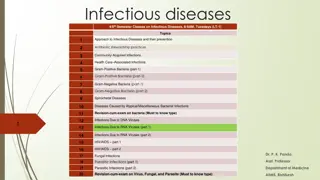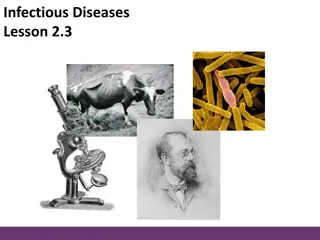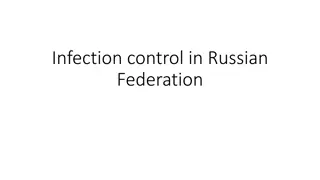Understanding Infectious Diseases: Transmission Methods
Learn about how infectious diseases are transmitted through various means such as food and water contamination, insect bites, direct and indirect contact. Enhance your knowledge of disease spread and prevention to stay healthy.
Download Presentation

Please find below an Image/Link to download the presentation.
The content on the website is provided AS IS for your information and personal use only. It may not be sold, licensed, or shared on other websites without obtaining consent from the author. Download presentation by click this link. If you encounter any issues during the download, it is possible that the publisher has removed the file from their server.
E N D
Presentation Transcript
Secondary Education English 301 New Language Leader 3 Unit 4 Lesson 2 Malaria 1
Eng.301 Unit 4 lesson 2 Malaria OBJECTIVES: By the end of the lesson, you will be able to: extract specific information and language items from a reading text. extend your range of vocabulary related to illness and medicine. revise and extend your understanding of the future tense. apply the present continuous , be going to an the future continuous in different contexts. 2
Did you know that heart disease kills more people per year than cancer, war, terrorism, hunger, suicide, diabetes, respiratory diseases and mental disorders combined? "Pathogen" is the scientific name for "germ ? Infectious diseases are caused by pathogens. When your mom says to wash your hands because of germs, she wants you to get all the pathogens off your hands so they won't go into your mouth and body. Maybe after reading this, you will wash your hands a bit more! cancers are primarily environmental diseases with 90-95% of cases attributed to environmental factors and 5 10% due to genetics? in 5,000 years of human history, only 2 diseases have been eradicated: smallpox and rinderpest? many common disease-causing bacteria are actually harmless bacteria that have been infected by a virus? diabetes was the third leading cause of death by disease in America? It has increased 50 percent since 1965, and today affects at least 15 million people. malaria is one of the earliest ever recorded? The first record of it dates back over four thousand years. Eng.301 Unit 4 lesson 2 Malaria 3
What is an infectious disease? infectious means can spread from one person to another. Fill in the blanks with the words from the box below to know more about the several ways infectious diseases can be transmitted. influenza humans shaking spread mosquitoes objects undercooked contaminated Food and water contamination - Some diseases are passed on by _________food or water. This can occur in ______food or when sewage gets into the water supply. Examples of diseases that are transmitted this way include E. coli, cholera, and salmonella. Insect bites - Insects such as fleas,______, and ticks can carry pathogens (germs) that get be passed on when they make contact with______. Diseases from insects include malaria (mosquitoes), Lyme disease (ticks), and the bubonic plague (fleas). Direct contact - Diseases are often passed from person to person by direct contact. This could include ______hands, sneezing (airborne), etc. Examples include_______, the common cold, and chickenpox. Indirect contact - Some pathogens can survive for a while outside the host. They may be on _____such as doorknobs and telephones. Many of the same diseases, but not all, that can _____through direct contact can also be spread through indirect contact. Eng.301 Unit 4 lesson 2 Malaria 4
Now check your answers Food and water contamination - Some diseases are passed on by ______________food or water. This can occur contaminated in ______________food or when sewage gets into the water supply. Examples of diseases that are transmitted undercooked this way include E. coli, cholera, and salmonella. Insect bites - Insects such as fleas,______________, and ticks can carry pathogens ( germs) that get be passed mosquitoes on when they make contact with___________. Diseases from insects include malaria (mosquitoes), Lyme humans disease (ticks), and the bubonic plague (fleas). Direct contact - Diseases are often passed from person to person by direct contact. This could include __________hands, sneezing (airborne), etc. Examples include___________, the common cold, and chickenpox. shaking influenza Indirect contact - Some pathogens can survive for a while outside the host. They may be on __________such as objects doorknobs and telephones. Many of the same diseases, but not all, that can spread through direct contact can also be __________through indirect contact. spread Eng.301 Unit 4 lesson 2 Malaria 5
Write down the following questions before moving to the passage on the next slide. A) Decide whether these statements are true or false. statement True False 1. It is not possible to recover from malaria. 2. Sufferers of malaria notice the symptoms within a few days of being infected. 3. Today, many people are killed by malaria. B) Match the words in bold in the text to their definitions. Note that there is one EXTRA definition. borne severe promptly diagnose devastating defer definition word 1. causing great damage or harm 2. Put off (an action or event) to a later time; postpone. 3. Identify the nature of (an illness or other problem) by examination of the symptoms. 4. Carried or transported by the thing specified. 5. The action of stopping something from happening or arising. 6. of a great degree, very serious and worrying 7. without delay: very quickly or immediately Eng.301 Unit 4 lesson 2 Malaria 6
Now read this text about the malaria disease and answer the questions that you covered on the previous slide. Malaria is a mosquito borne disease that is caused by a parasite (a kind of pathogens). It is found in many countries including sub-Saharan Africa, South Asia, as well as Central and South America. If a person is bitten by an infected Anopheles mosquito, symptoms typically occur within 1 - 4 weeks. The most common symptoms include shaking, chills, high fever, headache, sweats, body aches, and tiredness. Severe complications and death may also occur if the infection is not treated promptly. Today, half a billion people are diagnosed with it annually. Most of the cases are in Africa. Fortunately, not as many people are killed by this disease today. But, during World War II, over one hundred thousand U.S. troops were killed by malaria, which shows the devastating nature of this disease. While malaria is a serious illness that can be deadly, prevention methods are available. Rarely, people can get malaria through a blood transfusion or infants can get malaria before or during delivery if the mother is infected. Persons who have lived or traveled to areas where malaria is present are usually deferred from donating blood for 1- 3 years. Eng.301 Unit 4 lesson 2 Malaria 7
Now check your answers. A) Decide whether these statements are true or false. statement True False 1. It is not possible to recover from malaria. 2. Sufferers of malaria notice the symptoms within a few days of being infected. 3. Today, many people are killed by malaria. B) Match the words in bold in the text to their definitions. Note that there is one EXTRA definition. borne severe promptly diagnose devastating defer definition word devastating 1. causing great damage or harm defer 2. Put off (an action or event) to a later time; postpone. diagnose 3. Identify the nature of (an illness or other problem) by examination of the symptoms. past participle of bear borne 4. Carried or transported by the thing specified. X 5. The action of stopping something from happening or arising. severe 6. of a great degree, very serious and worrying promptly 7. without delay : very quickly or immediately Eng.301 Unit 4 lesson 2 Malaria 8
Grammar Time Expressing Future The Future Continuous Tense versus the Simple Future Tense The simple future tense (will/won t + inf) is a verb tense that is used when an action is expected to occur in the future and be completed. Example: I will arrive at five o clock. I will arrive is the simple future tense of the verb to arrive . You arrive once; beyond that, you can t keep on arriving. However, once you get there, you may be doing something that goes on continuously, at least for a certain period of time. Eng.301 Unit 4 lesson 2 Malaria 9
Grammar Time Expressing Future The Future Continuous Tense versus the Simple Future Tense We can use the future continuous (will/won't be + -ing form) to talk about future actions that: 1) will/won t be in progress at a specific time in the future: Examples: When you come out of school tomorrow, I'll be boarding a plane. You can visit us during the first week of July. I won't be working then. 2) we see as new, different or temporary: Today we're taking the bus but next week we'll be taking the train. He'll be staying with his parents for several months while his father is in recovery. It is formed using the construction will + be + the present participle (the root verb + -ing). Important Note: The future continuous tense is only used with action verbs, because it is possible to do them for a duration. (Action verbs describe activities like run, think, and see. Stative verbs describe states of existence, like be, seem, and know.) = To use the will + be + present participle construction with a stative verb would sound very odd indeed. Examples: I will be being stressed tomorrow during my science test. INCORRECT I will be stressed tomorrow during my science test. CORRECT Eng.301 Unit 4 lesson 2 Malaria 10
Practice: Decide whether you have to employ the simple future or the future progressive tense with will (be doing) / won t (be doing) in the following sentences. 1) - I ______________ (to do) my homework when my father comes home. will be doing - Don t worry, I _________________ (to help) you with your homework. will help will be playing 2) I ________________ (not to be) able to meet you because my brother and I ________________ (to play) will not be able soccer at school tomorrow evening. will be practising 3) Next Friday I _______________ (to study) for my French exam and my sister _______________(to practise) will be studying her choreography. 4) When I arrive at school, my classmates _________________(to correct) their homework and my teacher will be correcting _______________ (to prepare) a new lesson. will be preparing 5) When you get off the train, I _______________( to wait) for you by the ticket machine. will be waiting 6) You re carrying too much. I ____________( to open) the door for you. will open Eng.301 Unit 4 lesson 2 Malaria 11
Other Forms to Express Future Be going to-future Use of the be going to future to express planned actions or intentions in the future. We use it for decisions that we made before the moment of speaking. e.g. I am going to clean the car and you can pack the suitcase. (I have decided how to do it.) when You are certain that something is going to happen in the future (logical consequence). e.g. Look at that car! It is going to crash into the yellow one. Form: to be (am, are, is) + going to + infinitive 1. Affirmative sentences in the going to-future e.g. I am/ mgoingto play handball. You are/ re goingto miss the train. 2. Negative sentences in the going to-future e.g. He s/ is not/isn t going to play handball. You are not/aren tgoing miss the train. 3. Questions in the going to-future e.g.Am I going to play handball? Are you going to play handball? Eng.301 Unit 4 lesson 2 Malaria 12
Other Forms to Express Future present continuous to talk about the future The present continuouscan refer to the future. It shows that we have already decided something and usually that we have already made a plan or arrangements: e.g. The band is visiting Denmark next May. I am taking the train to Paris tomorrow. Form (To be (am, are, is + Verb + ing ) Sentences with this use of the present continuous always have words or phrases which refer to future time Examples: tonight tomorrow this weekend next Monday, next Friday this Saturday next week next weekend next year this evening etc. Eng.301 Unit 4 lesson 2 Malaria 13
A) Fill in the blanks with be going to and one of the verbs from the box. There is one Extra word. find be need become live 1. Many people _________________to the age of 100. are going to live 2. Young people __________________ a lot of job possibilities. are going to find 3. Some old people ________________ a lot of medical help. are going to need 4. _______you ____________a physician s assistant? Are going to be Eng.301 Unit 4 lesson 2 Malaria 14
B) Say if the Present Continuous expresses an activity happening now or a planned future arrangement. an activity happening now 1. It s eight o clock, Meg. Are you getting ready for school? a planned future arrangement 2. What time are Paul and Paula coming for dinner tonight? 3. Why are you laughing? an activity happening now a planned future arrangement 4. She is working late next Friday? Eng.301 Unit 4 lesson 2 Malaria 15
C) Put the words between brackets in the correct form to express the future. 1. I _____________(play) chess tonight with Tom and Ann. am playing 2 It's very cold. I ______________ (light) a fire. am going to light 3. We __________(have) some friends to lunch tomorrow. are having 4. We ___________(take) the children to the seaside this summer. are taking 5. I ________________ (read) you some of my own poems. am going to read 6. The inspector _____________(ask) you a few questions. is going to ask 7. Mr. Pitt has just phoned to say that he ___________ (not come) back till is not coming Wednesday night. Eng.301 Unit 4 lesson 2 Malaria 16
THIS IS THE END OF THE LESSON THANK YOU FOR YOUR ATTENTION Eng.301 Unit 4 lesson 2 Malaria 17


